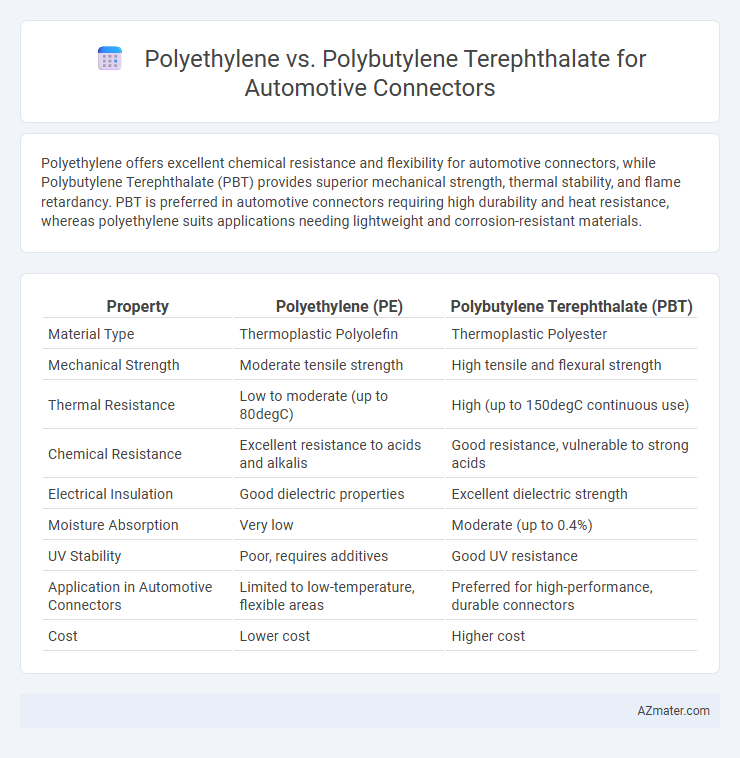Polyethylene offers excellent chemical resistance and flexibility for automotive connectors, while Polybutylene Terephthalate (PBT) provides superior mechanical strength, thermal stability, and flame retardancy. PBT is preferred in automotive connectors requiring high durability and heat resistance, whereas polyethylene suits applications needing lightweight and corrosion-resistant materials.
Table of Comparison
| Property | Polyethylene (PE) | Polybutylene Terephthalate (PBT) |
|---|---|---|
| Material Type | Thermoplastic Polyolefin | Thermoplastic Polyester |
| Mechanical Strength | Moderate tensile strength | High tensile and flexural strength |
| Thermal Resistance | Low to moderate (up to 80degC) | High (up to 150degC continuous use) |
| Chemical Resistance | Excellent resistance to acids and alkalis | Good resistance, vulnerable to strong acids |
| Electrical Insulation | Good dielectric properties | Excellent dielectric strength |
| Moisture Absorption | Very low | Moderate (up to 0.4%) |
| UV Stability | Poor, requires additives | Good UV resistance |
| Application in Automotive Connectors | Limited to low-temperature, flexible areas | Preferred for high-performance, durable connectors |
| Cost | Lower cost | Higher cost |
Introduction to Polyethylene and Polybutylene Terephthalate
Polyethylene (PE) is a versatile thermoplastic known for its excellent chemical resistance, low moisture absorption, and cost-effectiveness, making it suitable for various automotive applications, including connectors that require durability and flexibility. Polybutylene Terephthalate (PBT) is a high-performance engineering thermoplastic characterized by its superior mechanical strength, dimensional stability, and resistance to heat and chemicals, which enhances the reliability of automotive connectors under harsh operating conditions. The choice between polyethylene and PBT for automotive connectors depends on specific requirements for thermal resistance, mechanical properties, and environmental exposure.
Chemical Structure and Composition Comparison
Polyethylene consists of long chains of ethylene monomers with a simple hydrocarbon backbone, offering excellent chemical resistance and flexibility but limited thermal stability. Polybutylene Terephthalate (PBT) is a thermoplastic polyester composed of butylene glycol and terephthalic acid, characterized by a rigid aromatic ring structure that delivers superior mechanical strength and higher heat resistance. The chemical composition difference results in polyethylene's better electrical insulation and moisture resistance, whereas PBT is preferred in automotive connectors for its dimensional stability and resistance to chemicals under high-temperature conditions.
Mechanical Properties in Automotive Applications
Polyethylene offers excellent flexibility and impact resistance, making it suitable for automotive connectors requiring durability under vibration and thermal expansion. Polybutylene Terephthalate (PBT) provides superior mechanical strength, higher tensile modulus, and excellent dimensional stability, which enhances connector performance in high-temperature and high-stress automotive environments. The choice between polyethylene and PBT hinges on specific mechanical property needs, such as PBT's enhanced rigidity versus polyethylene's better impact absorption in automotive connector applications.
Thermal Stability and Heat Resistance
Polybutylene Terephthalate (PBT) offers superior thermal stability and heat resistance compared to Polyethylene (PE), maintaining mechanical properties at elevated temperatures up to 150degC. PBT's crystalline structure provides enhanced dimensional stability and resistance to thermal deformation, making it ideal for automotive connectors exposed to engine heat. In contrast, Polyethylene has lower melting points and poor thermal endurance, limiting its use in high-temperature automotive environments.
Electrical Insulation Performance
Polybutylene Terephthalate (PBT) offers superior electrical insulation performance compared to Polyethylene, making it ideal for automotive connectors exposed to high voltage and fluctuating temperatures. PBT exhibits excellent dielectric strength and low moisture absorption, ensuring consistent insulation properties under harsh automotive conditions. Polyethylene, while cost-effective with good insulation, lacks the thermal stability and long-term electrical reliability required for advanced automotive connector applications.
Durability and Resistance to Chemicals
Polybutylene Terephthalate (PBT) outperforms Polyethylene (PE) in automotive connector applications due to its superior durability and enhanced resistance to automotive fluids such as oils, fuels, and coolants. PBT's high mechanical strength and excellent thermal stability ensure long-lasting performance under harsh operating temperatures and mechanical stress, whereas Polyethylene tends to degrade faster when exposed to aggressive chemicals and elevated temperatures. The superior chemical resistance of PBT reduces the risk of connector failure, making it the preferred polymer for reliable and durable automotive electrical connections.
Processing and Manufacturing Considerations
Polyethylene offers excellent processability with low melting temperatures and high flexibility, making it suitable for injection molding complex automotive connectors with fast cycle times. Polybutylene terephthalate (PBT) requires higher processing temperatures due to its semi-crystalline structure but provides superior mechanical strength, dimensional stability, and chemical resistance, essential for durable automotive connector housings. Manufacturing considerations favor polyethylene for cost-effective, high-volume production, while PBT is preferred for applications demanding enhanced thermal performance and longevity under harsh automotive conditions.
Cost Implications for Automotive Connectors
Polyethylene (PE) offers lower raw material and processing costs compared to Polybutylene Terephthalate (PBT), making it a budget-friendly option for automotive connectors. However, PBT provides superior thermal stability, chemical resistance, and mechanical strength, which can reduce long-term maintenance and replacement expenses. Choosing between PE and PBT depends on balancing initial cost savings against durability and performance requirements in automotive connector applications.
Environmental Impact and Recyclability
Polyethylene (PE) offers advantages in automotive connector applications due to its relatively low environmental impact, with high recyclability rates and widespread recycling infrastructure supporting circular economy goals. Polybutylene terephthalate (PBT) provides superior mechanical and thermal properties but poses challenges in recycling because of its more complex chemical structure and limited recycling streams, often resulting in downcycling. Choosing polyethylene enhances sustainability through easier material recovery and reduced environmental footprint, while PBT prioritizes performance with trade-offs in eco-friendly recyclability.
Summary: Choosing the Right Material for Automotive Connectors
Polyethylene offers excellent chemical resistance and flexibility, making it suitable for automotive connectors exposed to harsh environments and vibration. Polybutylene Terephthalate (PBT) provides superior mechanical strength, thermal stability, and electrical insulation, ideal for high-performance connectors requiring durability and heat resistance. Selecting the right material depends on the specific application needs, balancing environmental exposure, mechanical stress, and thermal demands for optimal connector reliability.

Infographic: Polyethylene vs Polybutylene Terephthalate for Automotive Connector
 azmater.com
azmater.com